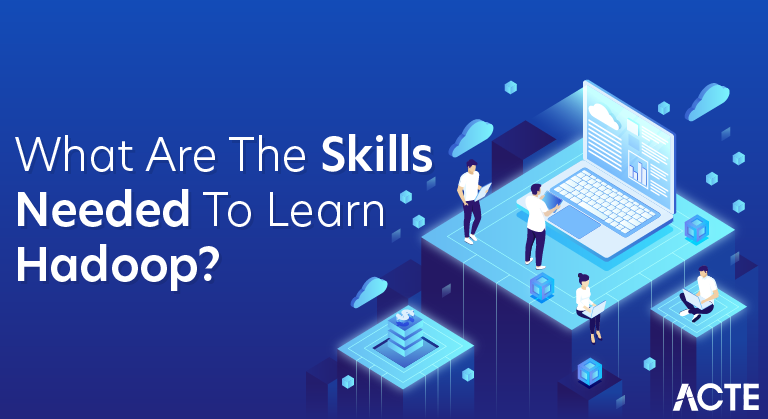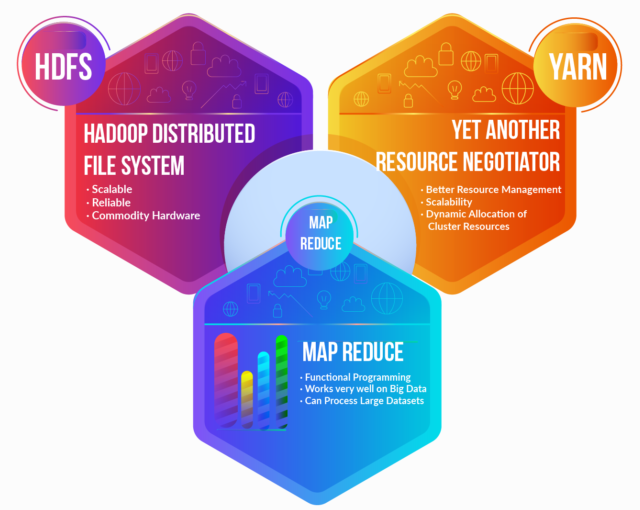
What Are the Skills Needed to Learn Hadoop? – Expert’s Top Picks
Last updated on 15th Jul 2020, Blog, General
Technology has changed its landscape. Everything you may hear today is revolving around some big terms like big data, cloud, AI, data science, etc. To put it in another way IT professionals are following the trajectory of these booming technologies.
- Big Data is something that has taken a high momentum in the last two years. And when we talk about big data, Hadoop is the ultimate term that comes to mind. No other big data processing tool has gained such market popularity than this open source tool from Apache.
- However, Hadoop is a growing field with continuous up-gradation and added features as well as members in its ecosystem. Hence, it is, of course, a challenging question: how to start learning Hadoop for beginners and what to cover?
- In this blog, we will try to familiarize you with a road map of learning Hadoop as a beginner. Just get ready to find the best way to learn Hadoop!
- Enroll Now: Hadoop Basics Online Training Course
Apache Hadoop ecosystem is composed of the following components
- Hadoop Distributed File Systems: HDFS is the primary storage solution used by the Hadoop applications. With this distributed file system, one can have access to the application data.
- Hadoop MapReduce: It is the software framework that is responsible for the parallel processing of data.
- Hadoop YARN: The resource management technology of Hadoop, YARN is responsible for the job scheduling and resource management.
- Hadoop Common: The component of the Hadoop ecosystem that contains Java libraries and utilities that support Hadoop modules.

Have a Quick View of Market Data Before You Start Learning Hadoop
- Before we start learning Hadoop for beginners in detail, ask yourself why do you want to learn Hadoop? Is it just because others are running on this track? Will it be helpful in the long run? So, why not to look at the market statistics to evaluate its value. Well, here is a rough statistics on Hadoop possibilities.
- 91% of market leaders rely on customer data to make a business decision. Moreover, they believe that these data are the key driver of success in business. With the changed marketing strategy, there is a surge in data generation in all sectors which is estimated almost 90% in the last two years.
- The big data market is going to expand worth USD 46 billion by the end of 2018. The annual growth of this will be approximately 23% by the end of 2019. There is a considerable gap between the ongoing demand for right skilled big data resources and supply.
Hence, there is an ongoing job opportunity in the big data domain for Hadoop professionals indeed.
Some Helpful Skill Sets for Learning Hadoop for Beginners
Though it is not mandatory, however, if you should have the working knowledge of the following technologies to grasp Hadoop fast. However, if you are unfamiliar with it, learning is the solution for them. Take help from books, online materials, experienced people or simply join a course to get hold of them and move forward!
Now let’s have a look at the necessary technical skills for learning Hadoop for beginners.
Linux Operating System
Linux as the operating system and Ubuntu as server distribution is the preferred choice for Hadoop installation. So, basic working knowledge of Linux like commands, the editor works like wonder and makes your life easier during Hadoop installation and file management.
However, if you are a novice on it, you can grab an Ubuntu image and can learn the features by installing it in a virtual box.
Programming Skills
Hadoop is not restricted to any particular job role and handles different languages depending on that. For example, a data analyst may need to know R or Python, whereas a Hadoop developer must know Java or Scala. Overall Hadoop is related to a programming language.
Hence, with prior knowledge of any programming language, learning Hadoop for beginners becomes easier. Again, that doesn’t mean Hadoop is not for a non-programmer. Many skilled Java professionals also learn R/Python from scratch. Furthermore, with more and more demand for Hadoop in the market, training or learning these languages are not a tough job today.
SQL Knowledge
This is one area which you must focus on irrespective of your future role in Hadoop jobs. Hadoop is all about handling and processing data. Hence, knowledge of SQL query and commands are must to learn Apache Hadoop.
Furthermore, the Hadoop ecosystem has many software packages like Apache Hive, HBase, and Pig, etc. that extracts data from HDFS using SQL like queries. So, if you are not hands-on with SQL query at all, practice it using MySQL workbench or other tools.
Hadoop Developer Skills
The hiring managers look for some particular skills to have an eligible candidate for the open job position. The Hadoop developer job description generally consists of the following Hadoop developer skills. If one has all or some of these skills and satisfy the Hadoop developer job description, he will be considered the suitable applicant for the Hadoop developer job. Here are the skills required for Hadoop developer job:
- Familiarity with the Hadoop ecosystem and its components: obviously, a must!
- Ability to write reliable, manageable, and high-performance code
- Expertise knowledge of Hadoop HDFS, Hive, Pig, Flume and Sqoop.
- Working experience in HQL
- Experience of writing Pig Latin and MapReduce jobs
- Good knowledge of the concepts of Hadoop.
- Analytical and problem-solving skills; the implementation of these skills in Big Data domain
- Understanding of data loading tools such as Flume, Sqoop etc
- Good knowledge of database principles, practices, structures, and theories
Understand the Basics – The Stepping Stone to Learn Apache Hadoop
Step 1: Know the purpose of learning Hadoop
Before you proceed to learn Hadoop as a beginner, stop for a while and think about why Hadoop is so popular and its usability in the technology market. This will help you to understand the core idea behind Hadoop’s functionalities. To achieve this
- Watch webinars
- Follow documentation available on the internet
- Read Case studies and white papers
Step 2: Identify Hadoop components
Get yourself acquainted with the underlying architecture of Hadoop. To do that try to understand how the components like HDFS, MapReduce and Yarn works in the architecture. Once you get the picture of this architecture, then focus on the overall Hadoop ecosystem which typically means knowing different tools that work with Hadoop.
The best way to move is installing Hadoop and doing hands-on practice to know more about its practical aspects.
Step 3: Theory – A must to do
Without knowing the theory, you cannot move more. Hence, following good books, articles and case studies are essential to grab the knowledge properly. There are a lot of good books available in the market that can help you at all stages. Books like Hadoop – the Definitive Guide works like the bible of Hadoop for the beginners.
The Best Way to Learn Hadoop
Once you’re familiarized with the basics of the Hadoop, you are ready to move to the next levels to learn Hadoop.
Step 1: Get your hands dirty
Practice makes a man perfect. The more you practice hands-on with Hadoop, the more you get insights on it. Beginners can download and set up a virtual machine provided by Horton works or Cloudera – the two major vendors of the Hadoop industry. The alternate way is to access a pre-installed set up of VM from any training source. Both the way you can access and practice Hadoop and make your Hadoop learning process faster and effective.
Step 2: Become a blog follower
Following blogs help one to gain a better understanding than just with the bookish knowledge. There are a good number of big data blogs for beginners available online to provide you a perception of the trends and innovation happening in the field.
Step 3: Join a course
Joining a guided course always helps well and makes learning Hadoop easier for beginners. There are many classrooms and online training facilities available in the market for learning Hadoop for beginners. Moreover, these courses come with additional packages and tools to learn the Hadoop ecosystem.
Step 4: Follow a certification path
Ultimately, your goal of learning Hadoop as a beginner is to get a place in the Hadoop industry. If you are in the same line why don’t you follow a certification road map? No doubt, a certification from Horton works or Cloudera will distinguish you from others with the same skill without any question.
